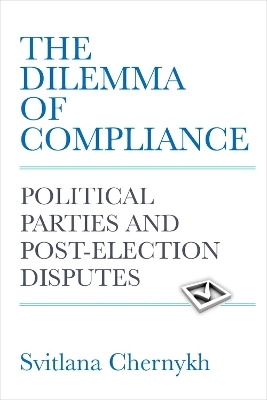
The Dilemma of Compliance
Political Parties and Post-Election Disputes
Seiten
2024
The University of Michigan Press (Verlag)
978-0-472-07608-6 (ISBN)
The University of Michigan Press (Verlag)
978-0-472-07608-6 (ISBN)
Over the past twenty years, the causes and consequences of post-election disputes have become one of the most compelling topics of research in political science. This book analyzes this phenomenon at the level of political parties, offering a new theoretical framework for studying electoral compliance.
Over the past twenty years, the causes and consequences of post-election disputes have become one of the most compelling topics of research in political science. Between 2012 and 2022, political parties challenged the results of more than 25 percent of elections. When democratic transitions are dependent on the willingness of participants to accept defeat, political parties can undermine election-based democracy by rejecting the outcome. As the world enters the fourth decade since the start of the third wave of democratization, the question of whether election losers will comply or reject election outcomes is more and more pressing. The Dilemma of Compliance analyzes this phenomenon at the level of political parties, raising three important questions: Why do some political parties refuse to comply with election results? What determines the strategies they use to contest the outcomes? What consequences do post-election disputes have for the political parties that initiate them?
To answer these questions, this book draws on an original dataset of post-election responses encompassing over 300 political parties, which participated in 270 elections held in twenty-two countries of Eastern Europe and the former Soviet Union over a period of more than two decades. In doing so, it offers a new theoretical framework for studying electoral compliance in comparative perspective and advances research on democratic transition, democracy promotion, post-election protests, and party politics.
Over the past twenty years, the causes and consequences of post-election disputes have become one of the most compelling topics of research in political science. Between 2012 and 2022, political parties challenged the results of more than 25 percent of elections. When democratic transitions are dependent on the willingness of participants to accept defeat, political parties can undermine election-based democracy by rejecting the outcome. As the world enters the fourth decade since the start of the third wave of democratization, the question of whether election losers will comply or reject election outcomes is more and more pressing. The Dilemma of Compliance analyzes this phenomenon at the level of political parties, raising three important questions: Why do some political parties refuse to comply with election results? What determines the strategies they use to contest the outcomes? What consequences do post-election disputes have for the political parties that initiate them?
To answer these questions, this book draws on an original dataset of post-election responses encompassing over 300 political parties, which participated in 270 elections held in twenty-two countries of Eastern Europe and the former Soviet Union over a period of more than two decades. In doing so, it offers a new theoretical framework for studying electoral compliance in comparative perspective and advances research on democratic transition, democracy promotion, post-election protests, and party politics.
Svitlana Chernykh is Senior Lecturer in the School of Politics and International Relations at Australian National University.
Acknowledgment
List of Tables
List of Figures
Chapter 1. Introduction: The Dilemma of Compliance
Chapter 2. A New Framework for Analysis of Post-election Disputes
Chapter 3. When Do Political Parties Reject Election Results?
Chapter 4. Who Rejects Election Results?
Chapter 5. The Fates of Political Parties Post Election Dispute
Chapter 6. Conclusion: Political Parties and Post-election Disputes
Appendices
Notes
References
Index
| Erscheint lt. Verlag | 17.12.2024 |
|---|---|
| Zusatzinfo | 12 figures, 11 tables |
| Verlagsort | Ann Arbor |
| Sprache | englisch |
| Maße | 152 x 229 mm |
| Gewicht | 454 g |
| Themenwelt | Recht / Steuern ► Allgemeines / Lexika |
| Recht / Steuern ► EU / Internationales Recht | |
| Sozialwissenschaften ► Politik / Verwaltung ► Politische Theorie | |
| Sozialwissenschaften ► Politik / Verwaltung ► Staat / Verwaltung | |
| ISBN-10 | 0-472-07608-6 / 0472076086 |
| ISBN-13 | 978-0-472-07608-6 / 9780472076086 |
| Zustand | Neuware |
| Informationen gemäß Produktsicherheitsverordnung (GPSR) | |
| Haben Sie eine Frage zum Produkt? |
Mehr entdecken
aus dem Bereich
aus dem Bereich
ein Vortrag
Buch | Softcover (2024)
Suhrkamp (Verlag)
10,00 €
Buch | Softcover (2024)
Mohr Siebeck (Verlag)
39,00 €
Aufgaben, Arbeitsweisen, Anforderungen
Buch | Softcover (2024)
Kohlhammer (Verlag)
28,00 €


